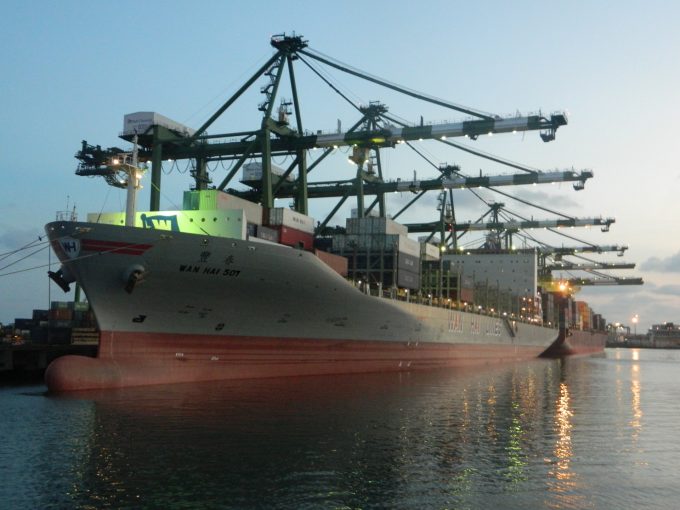Yang Ming to order 13 newbuild box ships for fleet renewal and new markets
Yang Ming today announced plans to acquire 13 containerships ranging in capacity from 8,000 to ...
FDX: ABOUT USPS PRIVATISATIONFDX: CCO VIEWFDX: LOWER GUIDANCE FDX: DISRUPTING AIR FREIGHTFDX: FOCUS ON KEY VERTICALFDX: LTL OUTLOOKGXO: NEW LOW LINE: NEW LOW FDX: INDUSTRIAL WOESFDX: HEALTH CHECKFDX: TRADING UPDATEWMT: GREEN WOESFDX: FREIGHT BREAK-UPFDX: WAITING FOR THE SPINHON: BREAK-UP ALLUREDSV: BREACHING SUPPORTVW: BOLT-ON DEALAMZN: TOP PICK
FDX: ABOUT USPS PRIVATISATIONFDX: CCO VIEWFDX: LOWER GUIDANCE FDX: DISRUPTING AIR FREIGHTFDX: FOCUS ON KEY VERTICALFDX: LTL OUTLOOKGXO: NEW LOW LINE: NEW LOW FDX: INDUSTRIAL WOESFDX: HEALTH CHECKFDX: TRADING UPDATEWMT: GREEN WOESFDX: FREIGHT BREAK-UPFDX: WAITING FOR THE SPINHON: BREAK-UP ALLUREDSV: BREACHING SUPPORTVW: BOLT-ON DEALAMZN: TOP PICK

Singapore-based terminal giant PSA International is seeking a premature exit from its ‘debut’ container terminal concession in India, which began operations in 1999 at Tuticorin, near Chennai, now renamed VO Chidambaranar (VOC).
PSA Sical Terminals’ 30-year build-operate-transfer (BOT) contract should run through 2028, with an annual capacity of 450,000 teu, but roiled by multiple growth pain points and seeing no room for relief, PSA has approached the local arbitration tribunal for an early end, according to industry sources.
That move follows PSA’s protracted legal battles over tariff setbacks and its perceived lack of infrastructure support from the port authority yielding no favourable results.
“PSA Sical has been victimised because of wrong policy guidelines,” claimed a PSA India source to The Loadstar. “We have struggled to fix things, but to no avail.”
In its early years, the terminal had the best productivity rates and was often declared the most efficient among Indian container handlers. But, as competition intensified, its fortunes deteriorated rapidly.
The existential crisis for PSA Sical is rooted in large part in its cost-competitive problems, due to lopsided tariff regulations. Some 15 BOT operators had concession contracts, signed between 1997 and 2007, governed under a complex tariff model, involving a cost-plus pricing method that the industry regulator Tariff Authority for Major Ports (TAMP) was using to determine scale of rates for concessionaires, with revisions implemented every three years.
Those regulations presented competitive disadvantages for BOT investors regarding additional income generated from container volumes handled beyond minimum performance commitments, and also the scale of royalty amounts payable to landlord ports in the form of revenue sharing. According available data, amid legal disputes, PSA Sical’s royalty accruals towards VOC up to 2019 totalled more than $120m.
As a result, PSA Sical was forced to scale down throughput levels to the minimum guaranteed commitment in order to dodge the impact of those financial obligations. And thanks to these multiple challenges, including its inability to enhance infrastructure and capacity, PSA Sical claims it has suffered significant market share losses over the years.
Indeed, data shows volumes through PSA Sical have declined sharply, ending fiscal year 2023-24 at just 144,917 teu, and logging 79,722 teu from April through October.
Those figures compare with 602,446 teu and 384,122 teu for Dakshin Bharat Gateway Terminal, the other operator at VOC.
While there has been a series of policy reforms to mitigate industry concerns, it’s still not a level playing field for the investors who had spearheaded port privatisation in India after the early-1990 economic liberalisation.
Besides at VOC, PSA has terminal operations at the ports of Chennai and Nhava Sheva, at the latter set to open Phase 2 operations early next year. Newer concession awards are positioned better on the back of revised policies and a more pro-industry government approach to attracting investments.
Comment on this article